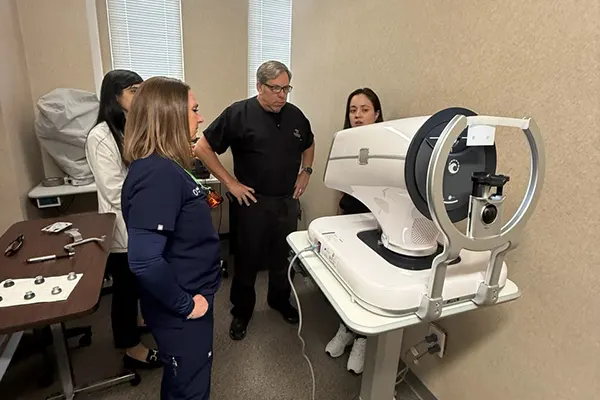Allergy Testing
Skin Tests
Skin tests are methods of testing for allergic antibodies. A test consists scratching or pricking the superficial layer of the skin and introducing small amounts of the suspected substance, or allergen, into the skin. The results are read 15 to 20 minutes after the application of the allergen, noting the development of a positive reaction, such as a wheal, swelling, or flare in the surrounding area of redness.
Interpreting the clinical significance of the skin tests requires skillful correlation of the test results with the patient’s clinical history. Positive tests indicate the presence of allergic antibodies, not necessarily clinical symptoms.
You will be tested for reactions to environmental airborne allergens including trees, grasses, weeds, molds, dust mites, and animal dander. Your appointment for the skin testing generally takes 30 minutes. The scratch tests are usually performed on your arms, but may also be performed on your back. Please wear a short-sleeved shirt to your appointment.
If you have a specific allergic sensitivity to one of the allergens, a red, raised, itchy bump (caused by histamine release into the skin) will appear on your skin within 15 minutes. These positive reactions will gradually disappear over a period of 30 to 60 minutes and typically no treatment is necessary for this itchiness. Your technician will apply topical anti-itch medication to the test sites to alleviate any discomfort. Occasionally, local swelling at a test site may begin 4 to 8 hours after the skin tests are applied. These reactions are not serious, but should be reported to your physician at your next visit.
Before Your Appointment
No prescription or over-the-counter oral antihistamines should be used 5 days prior to your scheduled skin testing. These include:
- Cold tablets
- Sinus tablets
- Hay fever medications or oral treatments for itchy skin
- Over-the-counter allergy medications, such as Claritin, Zyrtec, Allegra, Actifed, Dimetapp, or Benadryl
Discontinue Prescription Antihistamines
Prescription antihistamines such as Clarinex and Xyzol should also be stopped at least 5 days prior to testing. If you have any questions whether or not you are using an antihistamine, please ask the technician or the doctor. In some instances, a longer period of time off these medications may be necessary.
Discontinue Nasal and Eye Antihistamines
You should discontinue your nasal and eye antihistamine medications, such as Lastacaft, Zaditor, Patanase, Pataday, Astepro, Optivar or Astelin at least 5 days before the testing. In some instances, a longer period of time off these medications may be necessary. If you have any questions regarding the use of an antihistamine, please ask the technician or the doctor.
Discontinue Certain Over-the-Counter Medications
Medications such as over-the-counter sleeping medications (e.g. Tylenol PM) and other prescribed drugs, such as amitriptyline hydrochloride (Elavil), hydroxyzine (Atarx), doxepin (Sinequan), and imipramine (Tofranil) have antihistamine activity and should be discontinued at least 5 days prior to receiving skin test after consultation with your physician. Please make the doctor or technician aware of the fact that you are taking these medications so that you may be advised as to how long prior to testing you should stop taking them.
You May Continue Using Certain Medications
You may continue to use your intranasal allergy sprays such as Flonase Rhinocort, Nasonex, Nasacort, Omnaris, Veramyst and Nasarel.
Asthma inhalers (inhaled steroids and bronchodilators), leukotriene antagonists (e.g. Singulair, Accolate) and oral theophylline (Theo-Dur, T-Phyl, Uniphyl, Theo-24, etc.) do not interfere with skin testing and should be used as prescribed.
Most drugs do not interfere with skin testing but make certain that your doctor and technician know about every drug you are taking, including over-the-counter medications.
The Day of Your Appointment
Because occasional reactions may require immediate therapy, skin testing will be administered at this facility under the supervision of your doctor or other health care professional since. These reactions may consist of any or all of the following symptoms:
- Itchy eyes, nose, or throat
- Nasal congestion
- Runny nose
- Tightness in the throat or chest
- Increased wheezing
- Lightheadedness
- Faintness
- Nausea and vomiting
- Hives
- Generalized itching
- Shock (under extreme circumstances)
Please let the doctor or technician know if you are pregnant or taking beta-blockers. Allergy skin testing may be postponed until after the pregnancy to prevent the unlikely event of a reaction to the allergy testing. Beta-blockers are medications that may make the treatment of the reaction to skin testing more difficult.
Please note that these reactions rarely occur, but in the event a reaction would occur, the staff is fully trained and emergency equipment is available.
After skin testing, you will consult with your physician or other health care professional who will make further recommendations regarding your treatment.
We request that you do not bring small children with you for skin testing unless they are accompanied by another adult who can sit with them in the reception area.


